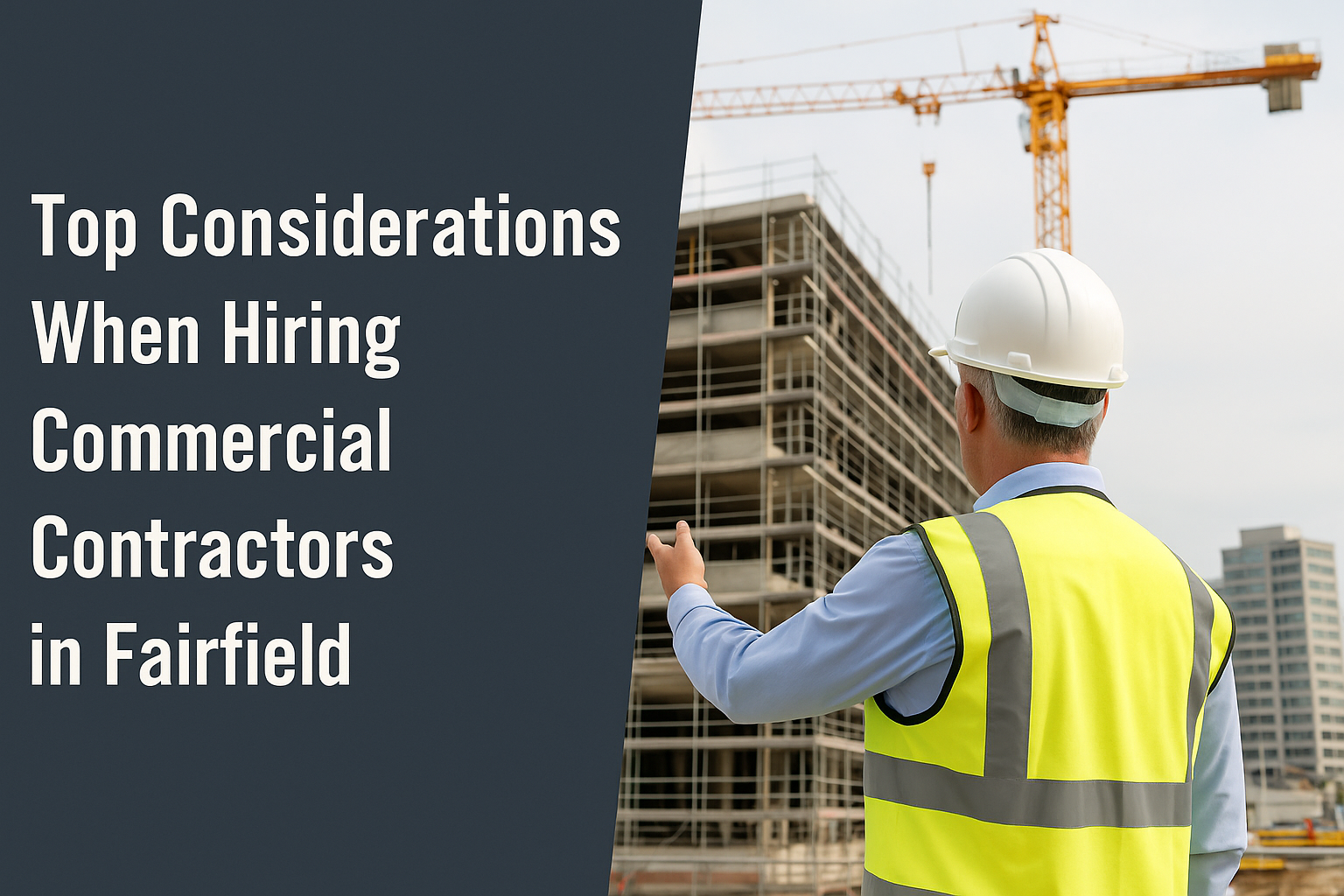Hiring the right commercial contractor can determine whether your project finishes on time, on budget, and to spec, or stalls in costly delays and disputes. In Fairfield County, where regulations, zoning, and property values carry significant weight, decision-makers can’t afford to misstep.
Below are the top considerations to guide your selection process and help protect your investment.
1. Local Licensing, Insurance, and Code Compliance
Fairfield municipalities each have distinct permitting and inspection standards. A reputable commercial contractor should be fully licensed in Connecticut and familiar with Fairfield County’s local ordinances. This includes:
- General liability and worker’s compensation insurance
- State and municipal license verification
- Experience navigating town zoning boards and inspection schedules
Failure to comply with these can lead to stop-work orders or rejected permits, delays that cost more than just time.
2. Proven Track Record with Similar Projects
Experience matters, but relevant experience matters more. Ask potential contractors for examples of past work that aligns with your project’s:
- Size (e.g., 5,000+ sq ft retail vs. tenant improvements)
- Industry (medical, hospitality, education, manufacturing)
- Scope (ground-up construction vs. renovations or additions)
Portfolios and references should reflect successful delivery on similar commercial jobs in Fairfield or neighboring towns like Stamford, Norwalk, or Westport.
3. Project Management and Communication
Clear communication reduces friction, especially when timelines tighten or scope evolves. Look for firms that offer:
- A dedicated project manager as your single point of contact
- Transparent scheduling tools (Gantt charts, critical path tracking)
- Real-time budget reporting
The best commercial contractors won’t just build, they’ll manage subcontractors, material deliveries, and approvals with minimal disruption to your business operations.
4. Financial Stability and Transparent Bidding
A contractor’s financial health can impact everything from material purchasing power to payroll reliability. Red flags include vague line items, high deposit demands, or reluctance to share references.
Instead, request:
- A detailed cost breakdown
- Proof of bonding capacity
- Trade partner/vendor references (especially local suppliers)
Solid firms won’t be the cheapest, but they will be the most predictable.
5. Familiarity With Fairfield County Market Dynamics
From coastal floodplain building codes in Southport to historical district guidelines in Fairfield Center, regional nuance matters. Contractors who work regularly in the area understand:
- Site-specific environmental or geological challenges
- Local subcontractor performance and availability
- Timing strategies to navigate town agency backlogs
They’ll also have pre-existing relationships that accelerate permitting and approvals.
6. Safety Culture and Site Supervision
OSHA compliance is only the baseline. High-performing contractors embed safety protocols into every phase of construction and back them with trained site supervisors.
Ask how the firm handles:
- Safety training for crew and subcontractors
- Daily site inspections
- Emergency response plans
A contractor’s jobsite is also your reputation, especially in public-facing retail or institutional projects.
7. Technology and Modern Construction Methods
The best firms leverage tools like Building Information Modeling (BIM), drone surveys, or integrated project delivery (IPD) to reduce errors and accelerate timelines. They may also use:
- Digital punch lists and closeout documents
- Cloud-based client portals for documentation
- Smart scheduling software with predictive risk alerts
If a contractor still relies on paper logs and hand-written schedules, consider it a risk.
8. Alignment on Project Goals and Timelines
Finally, a qualified contractor should align with your timeline and broader business objectives. Whether you’re aiming to open a retail location by Q3 or renovate office space during off-hours, the right partner will understand what’s at stake beyond the job site.
FAQ: Commercial Contractors in Fairfield
How much should I expect to pay a commercial contractor in Fairfield?
Pricing varies widely by scope, complexity, and materials. Most general contractors charge 10%–20% of total project cost as overhead and profit, with square foot costs ranging from $150 to $400+ depending on type.
Do I need to hire a separate architect?
Not always. Some contractors offer design-build services, meaning they handle both the architectural and construction sides in-house. This can simplify communication and reduce delays.
What’s the difference between a commercial and residential contractor?
Commercial contractors are licensed and experienced in building codes, structural demands, and timelines specific to business and institutional properties. Residential contractors often lack the scale, subcontractor network, or expertise for large-scale commercial jobs.
Is BHI General Contracting a commercial builder?
Yes. BHI General Contracting specializes in commercial construction throughout Fairfield County, including office renovations, retail build-outs, and industrial ground-up projects.
Conclusion
Choosing a commercial contractor is more than finding someone with a truck and tools. It’s hiring a partner who can safeguard your budget, protect your timeline, and deliver quality that lasts. Prioritize transparency, local experience, and proven systems to reduce risk and ensure your project moves from concept to completion without compromise.






